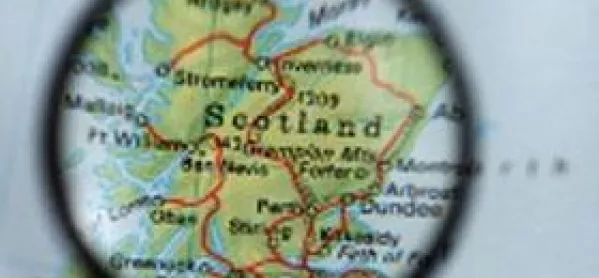Devolution ‘fails’ schools

The Scottish Parliament has failed education. This is the stark conclusion reached by an unlikely trio comprising a former Scottish ministerial adviser, a leading educationist and a right-leaning think tank.
John McLaren, an economist still closely linked to the Labour Party, suggests that, on the evidence of exam results in the final year of schooling, participation rates in higher education and international survey results, “England has continued to progress while Scotland has stood still since 1999” - despite Scotland continuing to enjoy a near 25 per cent lead in public spending over England.
Lindsay Paterson, professor of educational policy at Edinburgh University, agrees and argues that “English policy really has made a difference, and Scotland’s lack of structure and lack of central direction of practice is, at best, allowing performance to stagnate.”
Along with the Reform Scotland think tank, they draw attention to the results of Scottish pupils in their final year at school. This shows that 45 per cent of S4 pupils got five “good” grades in 2008, including English and maths, almost exactly the same as in 1999 when the Parliament was established. The definition of “good” from Reform Scotland is either Standard grades 1-3, Intermediate 2 at A-C or Intermediate 1 at A.
In England during the same decade, there was a 10 per cent increase in the number of pupils getting the equivalent of GCSEs at A*-C. Their performance surpassed that of Scottish pupils in 2007 and last year stood at 48 per cent.
Professor Paterson noted that, whereas the rank order of the four home countries in 1999 on that measure was Scotland, Northern Ireland, England and Wales, by 2006 England had risen to equal Scotland. England’s final school year results had improved by 11 points, that of Wales by six, Northern Ireland by seven - and Scotland by just one.
“It could be that the greater competitiveness and specialisation of English secondary schooling has introduced a dynamic of emulation and improvement which the more defensive policies of Scotland and Wales are not matching,” he says.
Mr McLaren believes that Scottish education could be lacking a “competition of ideas”, with fewer independent institutions undertaking policy research and analysis than in England. The result in Scotland is more “voter friendly” policies, such as no tuition fees or initiatives such as that on smaller classes which might appear to be based on “common sense” but might not be the most efficient option.
On class sizes, he adds: “This is a policy where the available evidence for positive outcomes is scant, especially in comparison to the impact from alternative policy measures.”
Mr McLaren points to a similar mismatch between rhetoric and evidence in higher education, where participation rates have been falling in Scotland but remaining steady in England despite what is regarded as its “more onerous student funding system.”
Professor Paterson agrees “there is no evidence that fees, living costs and the foregoing of earnings are a deterrent for any socio-economic group, despite all the rhetoric to the contrary: prospective students, even from the poorest backgrounds, can see the expected earning power and discount the cost accordingly.”
He suggests that Scots are more happy to trust the professionals and the technocrats than is the case in the rest of the UK. “The main cultural effect of devolution in Scotland has been to entrench the power of established professionals, not only in education but also in health.
“It has thus strengthened the influence over Scottish policy of that very class which Tom Nairn (in his book, Faces of Nationalism) famously castigated as craven and utterly unionist in its mentality and allegiance.”
In his comments, delivered in an address to the Institute for Public Policy Research, Professor Paterson concluded: “Devolution has had almost no impact on opportunity through education. The devolved institutions have taken almost no initiatives that might have differentially affected opportunity in the territories they govern.
“The only really important such initiative that is in prospect is the ending of selection for secondary school in Northern Ireland, which is likely to have a marked effect.”
How Scotland is stagnating- Trends in International Maths and Science Survey (Timms) - English scores are significantly higher than Scottish scores in both maths and science, the difference widening between 1995 and 2007
- Progress in International Reading Literacy Study (Pirls) - the English reading score fell by more than the Scottish score between 2001 and 2006, but it remained significantly higher
- Programme for International Student Assessment (Pisa) - scores for both England and Scotland fell in reading, maths and science between 2000 and 2006 and were not significantly different on any of the three measures; a slight improvement for Scotland which had lagged behind England in science in 2000
John McLaren
- Trends in International Maths and Science Survey (Timms) - English scores are significantly higher than Scottish scores in both maths and science, the difference widening between 1995 and 2007
- Progress in International Reading Literacy Study (Pirls) - the English reading score fell by more than the Scottish score between 2001 and 2006, but it remained significantly higher
- Programme for International Student Assessment (Pisa) - scores for both England and Scotland fell in reading, maths and science between 2000 and 2006 and were not significantly different on any of the three measures; a slight improvement for Scotland which had lagged behind England in science in 2000
John McLaren
Keep reading for just £1 per month
You've reached your limit of free articles this month. Subscribe for £1 per month for three months and get:
- Unlimited access to all Tes magazine content
- Exclusive subscriber-only stories
- Award-winning email newsletters

